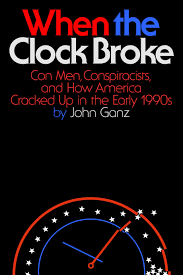The Other Nineties
In 'When the Clock Broke: Con Men, Conspiracists, and How America Cracked Up in the Early 1990s,' John Ganz recreates a wrongly right world
There's a pretty firm and popular picture that has taken hold of the 1990s as a sunny time: economic prosperity amid American victory in the Cold War; the Internet as a New Frontier; the frothy appeal of Friends and Seinfeld in a country still stitched together by (cable) television. And in fact there is substantial truth to this perception. But all eras are marked by tensions, if not contradictions: the 1920s was the era of flappers—and the Klan; the sixties was Woodstock—and Charles Manson. It’s also the case that there was a real difference in mood between the volatile early 1920s and the roaring late twenties, as well as a similar pattern in the nineties. In When the Clock Broke, John Ganz takes us on a semi-subterranean tour of the country in the immediate aftermath of the Reagan presidency, tracing a radical right that moved from the margins to the very center of the nation's political culture.
This is a skillfully written book. Its core organizing strategy is a set of portraits, ranging from white supremacist David Duke to gangster John Gotti, with often graceful transitions between them. Along the way, we also have more mainstream recurring figures such as Pat Buchanan, Ross Perot, and George W. Bush—with Bill Clinton as something as a foil for them all.
The book’s title is supplied by paleoconservative polemicist Murray Rothbard. When the eminent intellectual Russell Kirk (who amazingly, is still inhabiting the pages of the Wall Street Journal) cited T.S. Eliot’s injunction to “redeem the time,” Rothbard replied that it could not be: the clock had to be broken. “Kirk defined ‘the conservative person’ as simply ‘one who finds the permanent things more pleasing than Chaos and Old Night,” Ganz explains. But Rothbard reveled in both. “His proposal for a right-wing populist strategy was precisely the rejection of the politics of prudence, the genteel politics of respectability, in favor of rage, resentments, menaces, and affronts.” For Rothbard, Buchanan was the nearest approximation of what he sought.
In Ganz’s view, what links a cast of characters that also includes broadcaster Rush Limbaugh, survivalist Randy Weaver, and mayoral candidate Rudy Giuliani, is a deep-seated rejection of modernity in all its forms. His depiction of New York City in the early nineties—a cauldron of tribal resentments stirred by the Crown Heights riot of 1991—reflects a widespread, if diffuse, desire to rebel against the dictates of a managerial state that was no less suffocating to social conservatives than it was gang members. For such people, Francis Ford Coppola’s 1972 film The Godfather embodied a longing to recapture the familial capitalist spirit of the co-opted Western.
It's easy to read a book like When the Clock Broke and think: Ah, yes, the roots of Trump. And that’s true as far as it goes. Much of what Buchanan said that was regarded as incendiary in the early nineties—about illegal immigration, for example—has become commonplace today. But lunatic fringes have been a part of American life from the earliest days of the republic, when Anti-Masons raged against secret Freemasons who supposedly controlled the nation’s politics. We had crazy right-wingers like (Limbaugh’s broadcast forerunner) Father Coughlin during the New Deal, the John Birch Society during the Civil Rights movement, and so on. (And a few deranged left-wing movements as well.) They are a reminder of the anarchy that bubbles just below—and occasionally above—the surface of our national life. They tend to come and go without any particular rhyme or reason—and indeed it’s one of the weaknesses of this book that Ganz never really explains how Clinton, whose election was indeed tenuous, managed to preside over a country that was comparatively calm compared to what came before and followed (not that he was a particularly placid person himself). In any event, we should take note of the grievances expressed at the angry margins and seek responsible ways to defuse them. John Ganz does an exceptionally good job of articulating the worldview of disagreeable people—a worthy task.



